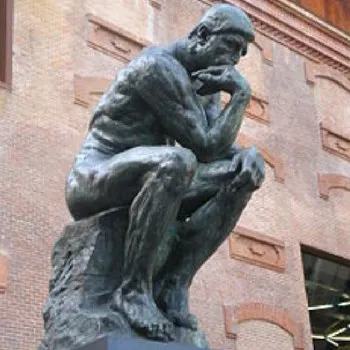SPINOZA
WHEN an American rabbi asked Einstein: “Do you believe in God?”
Einstein replied: “I believe in Spinoza's God, who reveals himself in the ordered harmony of what exists.”
What concept of God did this 17th century Dutch philosopher of Jewish origin have?
In short, that “everything that exists is part of God and that God is in everything that exists.”
Spinoza thought that “in God we literally live and move and have our being.”
But was such a God a reality for Spinoza and Einstein?
At best, for Spinoza and Einstein he was only a pantheistic god.
In what sense?
Well the term "pantheism" comes from two roots that mean "everything" and "god", and is defined as "the doctrine that identifies God with the forces and laws of the universe".
There is no doubt about it: The universe, the "book of nature", reveals many things about God. And it is admirable that even great genital and literate minds have recognized this truth with humility.
But for God to be a reality for us we need much greater knowledge than what we see in the universe.
We need divine revelation of him, and to discover and understand the why of many things.
In fact, in the letter to the Romans we read: 'How can you put faith in God without first hearing about him?' (Romans 10:14)
Lovingly, wisely, and righteously, God has given us that revelation, His Word, the Holy Bible.
From it we learn not only that he is the great First Cause but we also acquire knowledge of his qualities: that he is infinite in power and wisdom, entirely upright and just and that he is the personification of love.
Furthermore, from his Word we gain knowledge of his purposes that concern us personally.
Excerpt from the article:
“Is God a reality for you?”
Published by jw.org
QUANDO un rabbino americano chiese ad Einstein: “Crede in Dio?” Einstein rispose: “Credo nel Dio di Spinoza, che si rivela nell’ordinata armonia di ciò che esiste”.
Quale concetto di Dio aveva questo filosofo olandese di origine ebraica del XVII secolo?
In breve, che “tutto ciò che esiste fa parte di Dio e che Dio è in tutto ciò che esiste”. Spinoza pensava che “in Dio letteralmente viviamo e ci muoviamo e abbiamo il nostro essere”.
Ma per Spinoza e per Einstein un Dio simile era una realtà?
Nella migliore delle ipotesi, per Spinoza e per Einstein era solo un dio panteistico. In che senso? Ebbene il termine “panteismo” viene da due radici che significano “tutto” e “dio”, ed è definito “la dottrina che identifica Dio con le forze e le leggi dell’universo”.
Non c’è dubbio in merito: L’universo, il “libro della natura”, rivela molte cose riguardo a Dio. Ed è ammirevole che anche grandi menti genitali e letterate, abbiano riconosciuto questa verità con umiltà.
Ma affinché per noi Dio sia una realtà abbiamo bisogno di una conoscenza molto maggiore di quello che si vede nell’universo. Abbiamo bisogno della sua rivelazione divina, e scoprire e capire il perché di molte cose.
Infatti nella lettera ai Romani leggiamo: ‘Come si può riporre fede in Dio senza prima averne udito parlare?’ (Romani10:14)
Amorevolmente, saggiamente e giustamente, Dio ci ha dato tale rivelazione, la sua Parola, la Sacra Bibbia. Da essa apprendiamo non solo che è la grande Causa Prima ma acquistiamo anche conoscenza delle sue qualità: che è infinito in potenza e sapienza, interamente retto e giusto e che è la personificazione dell’amore. Dalla sua Parola, inoltre, acquistiamo conoscenza dei suoi propositi che ci riguardano personalmente.
Estratto dall'articolo:
"Dio è una realtà per voi?"
Edito da jw.org
Einstein replied: “I believe in Spinoza's God, who reveals himself in the ordered harmony of what exists.”
What concept of God did this 17th century Dutch philosopher of Jewish origin have?
In short, that “everything that exists is part of God and that God is in everything that exists.”
Spinoza thought that “in God we literally live and move and have our being.”
But was such a God a reality for Spinoza and Einstein?
At best, for Spinoza and Einstein he was only a pantheistic god.
In what sense?
Well the term "pantheism" comes from two roots that mean "everything" and "god", and is defined as "the doctrine that identifies God with the forces and laws of the universe".
There is no doubt about it: The universe, the "book of nature", reveals many things about God. And it is admirable that even great genital and literate minds have recognized this truth with humility.
But for God to be a reality for us we need much greater knowledge than what we see in the universe.
We need divine revelation of him, and to discover and understand the why of many things.
In fact, in the letter to the Romans we read: 'How can you put faith in God without first hearing about him?' (Romans 10:14)
Lovingly, wisely, and righteously, God has given us that revelation, His Word, the Holy Bible.
From it we learn not only that he is the great First Cause but we also acquire knowledge of his qualities: that he is infinite in power and wisdom, entirely upright and just and that he is the personification of love.
Furthermore, from his Word we gain knowledge of his purposes that concern us personally.
Excerpt from the article:
“Is God a reality for you?”
Published by jw.org
QUANDO un rabbino americano chiese ad Einstein: “Crede in Dio?” Einstein rispose: “Credo nel Dio di Spinoza, che si rivela nell’ordinata armonia di ciò che esiste”.
Quale concetto di Dio aveva questo filosofo olandese di origine ebraica del XVII secolo?
In breve, che “tutto ciò che esiste fa parte di Dio e che Dio è in tutto ciò che esiste”. Spinoza pensava che “in Dio letteralmente viviamo e ci muoviamo e abbiamo il nostro essere”.
Ma per Spinoza e per Einstein un Dio simile era una realtà?
Nella migliore delle ipotesi, per Spinoza e per Einstein era solo un dio panteistico. In che senso? Ebbene il termine “panteismo” viene da due radici che significano “tutto” e “dio”, ed è definito “la dottrina che identifica Dio con le forze e le leggi dell’universo”.
Non c’è dubbio in merito: L’universo, il “libro della natura”, rivela molte cose riguardo a Dio. Ed è ammirevole che anche grandi menti genitali e letterate, abbiano riconosciuto questa verità con umiltà.
Ma affinché per noi Dio sia una realtà abbiamo bisogno di una conoscenza molto maggiore di quello che si vede nell’universo. Abbiamo bisogno della sua rivelazione divina, e scoprire e capire il perché di molte cose.
Infatti nella lettera ai Romani leggiamo: ‘Come si può riporre fede in Dio senza prima averne udito parlare?’ (Romani10:14)
Amorevolmente, saggiamente e giustamente, Dio ci ha dato tale rivelazione, la sua Parola, la Sacra Bibbia. Da essa apprendiamo non solo che è la grande Causa Prima ma acquistiamo anche conoscenza delle sue qualità: che è infinito in potenza e sapienza, interamente retto e giusto e che è la personificazione dell’amore. Dalla sua Parola, inoltre, acquistiamo conoscenza dei suoi propositi che ci riguardano personalmente.
Estratto dall'articolo:
"Dio è una realtà per voi?"
Edito da jw.org
Related Stories










